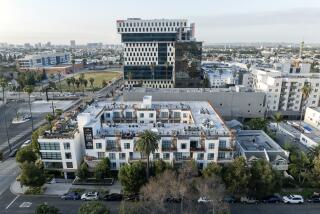Municipalities Oppose ‘Sales Tax Holiday’
When Gov. Gray Davis floated the idea of a back-to-school “sales tax holiday,” he conjured up cozy images of working families holding on to hard-earned dollars as their children prepared for the new school year. Both retailers and conservative lawmakers voiced support for suspending sales taxes on clothing, shoes and computer sales over a three-day weekend in August.
But the proposal, which mirrors programs in eight other states, has received a chilly reception from many Southern California officials, who could choose to eliminate their portion of the state sales tax during the same weekend.
Los Angeles City Controller Rick Tuttle said city coffers stand to lose more than $400,000 if the city participates. He cited the expense of litigation involving the Rampart police scandal and fallout from the state’s ongoing energy crisis as reasons he would take a cautious approach to any loss of revenues.
“If this is a bandwagon the state is considering starting, I think the city is well advised not to get on at this time,” Tuttle said.
The sales tax rate in the city is 8%, which is the same for virtually all of Los Angles County. County officials said any loss in sales tax revenue--which pumps about $35 million a year into the county’s general fund alone--would be hard to swallow.
“We don’t have the same surpluses that the state is benefiting from,” county Chief Administrative Officer David Janssen said. “So from an economic standpoint, it would be much more difficult for us to do what the governor is suggesting.”
Government officials in other parts of the Southland expressed similar reservations about the proposal, which would apply to purchases of up to $200 on clothing and shoes and $1,000 on computers and related equipment.
Orange County officials said they will give serious consideration to how the proposal would affect services funded through sales tax revenues. The sales tax there is 7.5%.
“There is approximately $1 million a day that could be taken away from important programs like public safety, health care and social services in order to participate in this program,” Orange County spokeswoman Diane Thomas said.
Added Larry Parrish, chief executive of Riverside County: “I don’t have a lot of enthusiasm for it. It’s not that I like to tax people, but we’re trying to do a lot out here without a lot of money.”
While sales tax rates vary from county to county and sometimes within their boundaries, the state’s share of the tax is a flat 4.75%. If the California Legislature approves the plan in upcoming months, shoppers across the state would receive a tax break of at least that amount on a designated weekend.
But if Ventura County, for example, decided to follow the state’s lead and waive local sales taxes, shoppers in unincorporated areas would save 7% on purchases over the sales tax holiday weekend.
The decision on whether to participate ultimately would be made by the Ventura County Board of Supervisors. But Harry Hufford, the county’s interim chief administrative officer, had this reaction to the idea: “No way. . . . There are too many other demands at the local level without the resources to address them.”
Davis spokeswoman Hilary McLean stressed that local participation is optional. The governor, she said, believes the proposal will generate additional revenues since shoppers are likely to make purchases beyond the exemption categories.
“If you look at experiences of other states,” McLean said, “they’ve found it’s been wildly successful and led to increased sales and tax revenues because people bought other items.”
Fans of the tax cut proposal include Bill Dombrowski, president of the California Retailers Assn.
“We love the idea,” said Dombrowski. “Everywhere it has been tried it has been a phenomenal success. . . . Customers just flock to the stores.”
The idea also received a nod of approval from Los Angeles County Supervisor Mike Antonovich, a conservative who called it a good step for consumers. He favors making the cuts permanent.
While the proposal has gotten mixed reviews from legislative leaders in Sacramento, Assembly GOP leader Bill Campbell of Villa Park likes the idea and has been quick to note that Texas already holds such a holiday thanks to former Gov. George W. Bush.
Texas is among the eight states with sales tax holidays, which are pleasing to retailers and many politicians, but have triggered tensions between state and local officials and among counties competing for sales.
After New York state began offering a sales tax holiday in 1997, some counties that joined the state in offering the tax cut launched advertising campaigns in neighboring counties that chose not to participate, said Ken Crannell, a director with the New York State Assn. of Counties. “I know there’s been heightened competition between the counties,” he said.
New York, which had been holding the weeklong events twice a year, made its portion of the tax break permanent last year. But only 14 counties and five cities followed suit.
The reason, according to Crannell, was the loss of revenues. State officials hold a different view.
“There has been between a $500 million and $600 million a year in savings to consumers, and New York state is still running a surplus,” said Marc Carey, spokesman for the New York State Department of Taxation and Finance.
Consumers Support Tax Holidays
One thing is certain: The events are popular with consumers who have stampeded malls to take advantage of tax breaks. How much the savings help working families remains unclear.
“I think they think they’re getting a big bonanza, but I don’t know if they are,” said Frank Sturzl, executive director of the Texas Municipal League. “During the sales tax holiday weekend lottery sales here went way up . . . the theory being what people saved at the mall they went and bought lottery tickets with.”
Sturzl said there has been talk among some Texas lawmakers this year of extending the state’s sales tax holiday and expanding it to apply to merchandise such as backpacks. He said the proposal has not been well received by his 1,062 member cities.
Davis set aside $27 million in his 2001-02 budget plan to pay for the state’s share of the one-time tax holiday--making it a small, but high-profile item in his $3.1-billion tax relief plan.
“Viewed in a vacuum . . . $27 million is better than a poke in the eye,” said Sen. Tom McClintock (R-Northridge), who frequently rails against government spending practices. “But you have to remember sales taxes are going up $1.1 billion at the same time.”
McClintock is among a group of lawmakers calling for tax breaks in excess of $3 billion and for an extension of a quarter-cent sales tax cut in particular. Estimated to have saved consumers $1.1 billion, the latter tax cut was triggered last year due to record surpluses. The old rate is set to kick in again in 2002.
As the budget evolves in coming months, legislative support for the sales tax holiday could hinge on how strong the demand is by lawmakers for an extension of the quarter-cent sales tax cut and how Davis responds to that demand. Another unknown factor is how big a hit the state’s energy crisis will have on state revenues, which in a worst case scenario could pull the plug on the sales tax holiday and other new spending initiatives Davis has proposed.
Local attitudes toward a sales tax holiday also could change. A major source of tension between local officials and their state counterparts stems from the taking of billions in dollars of property tax revenues by the state from counties and cities during the deep recession of the early 1990s so the state could balance its budget.
State officials promised to return the money after the California economy recovered from its downturn but has yet to do so despite California’s economic boom in recent years that has resulted in multibillion-dollar surpluses. Antonovich estimates that Los Angeles County loses at least $1 billion a year due to the funding shift.
Davis vetoed a bill last year by Senate President Pro Tem John Burton (D-San Francisco) that would have returned a fraction of the lost revenues to counties and cities.
But in a nod to local governments, Davis budgeted $250 million for cities and counties in his spending plan. Lawmakers also have reignited the issue of returning at least some property tax money to local governments.
Legislation introduced last week by state Sens. Tom Torlakson (D-Antioch) and Liz Figueroa (D-Fremont) would grant exemptions to the funding shift in certain cases for library services, fire protection and parks.
“If there wasn’t this property tax shift going on, we would be much more amenable to a sales tax holiday,” said Steve Szalay, executive director of the California State Assn. of Counties.
More to Read
Start your day right
Sign up for Essential California for news, features and recommendations from the L.A. Times and beyond in your inbox six days a week.
You may occasionally receive promotional content from the Los Angeles Times.






